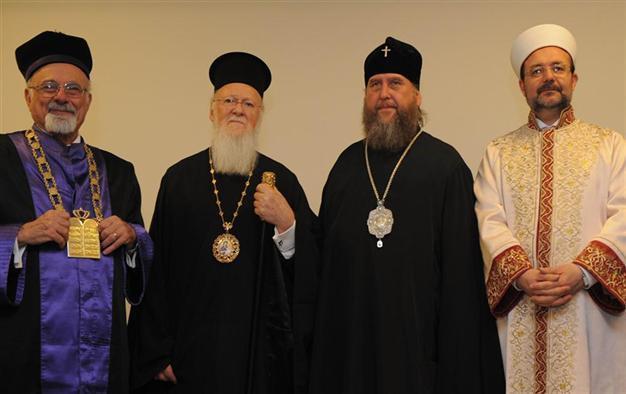Despite good record, Turkey favors Sunni groups, says US religious freedom report
WASHINGTON

Turkey's religious leaders are seen in this file photo. An annual US report on religious freedom has criticized the Turkish government for providing 'favorable and prejudicial' treatment to Sunni Islamic groups. DAILY NEWS photo / Emrah GÜREL
The Constitution and other laws and policies generally protect religious freedom, but the Turkish government still provides favorable and prejudicial treatment to Sunni Islamic groups, the U.S. State Department has said, in a wide-ranging annual report on religious freedom.“In general, members of religious groups that had formal recognition during the Ottoman period, including the Greek Orthodox, Armenian Orthodox, Syrian Orthodox, Armenian Protestant, and Jewish communities, reported they had freedom to practice their faiths,” the report said, while criticizing the government for providing favorable and prejudicial treatment to Sunni Islamic groups.
Secretary of State John Kerry, while acknowledging that the U.S. record was not perfect, called religious freedom a “universal value” as he presented the report in Washington.
The report cited the Directorate of Religious Affairs (Diyanet) which regulates the operation of more than 85,000 registered mosques and employs more than 117,000 imams, Quran instructors, muezzins, and other religious workers, all of whom are civil servants. “Its mandate is to promote the belief, worship, and moral principles of Islam, educate the public about religious issues, and administer places of worship.”
It said the government donates land for the construction of mosques and in many cases funds their construction through the Diyanet or municipalities. Municipalities pay the utility bills for mosques located within their boundaries. These benefits are uniquely available to Sunni Muslims. The state provides training for Sunni Muslim clerics. Religious groups other than Sunni Muslims do not have schools to train clerics inside the country.
The report also touched on the Greek Orthodox Halki Seminary. “The Greek Orthodox Ecumenical Patriarchate continued to seek to reopen the Halki seminary as an institution for religious training. Several high-level officials expressed support for reopening Halki, including Diyanet President Mehmet Görmez in his first meeting with the Ecumenical Patriarch in July. However, by year’s end, the government had not clarified the legal authority under which the seminary could reopen,” it said.
The report also cited the case of pianist Fazıl Say and said the government had brought blasphemy charges against individuals or organizations on several occasions. In June, prosecutors charged concert pianist Say with insulting religious values and fomenting hatred and enmity among the public for sending tweets on his Twitter account referring to a poem by 11th-century Persian poet Omar Khayyam and describing “heaven’s promise of rivers of wine” as a tavern and comparing the poem’s promise of virgins in the afterlife to a brothel.
















